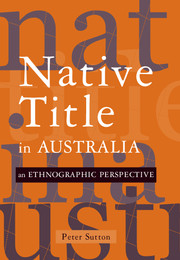Book contents
- Frontmatter
- Contents
- List of Figures
- Acknowledgements
- Introduction
- Map
- Chapter 1 Kinds of Rights in Country
- Chapter 2 Local Organisation Before the Land Claims Era
- Chapter 3 Aboriginal Country Groups
- Chapter 4 Atomism versus Collectivism
- Chapter 5 Underlying and Proximate Customary Titles
- Chapter 6 The System Question
- Chapter 7 Kinship, Filiation and Aboriginal Land Tenure
- Chapter 8 Families of Polity
- Notes
- References
- Index
Chapter 8 - Families of Polity
Published online by Cambridge University Press: 22 September 2009
- Frontmatter
- Contents
- List of Figures
- Acknowledgements
- Introduction
- Map
- Chapter 1 Kinds of Rights in Country
- Chapter 2 Local Organisation Before the Land Claims Era
- Chapter 3 Aboriginal Country Groups
- Chapter 4 Atomism versus Collectivism
- Chapter 5 Underlying and Proximate Customary Titles
- Chapter 6 The System Question
- Chapter 7 Kinship, Filiation and Aboriginal Land Tenure
- Chapter 8 Families of Polity
- Notes
- References
- Index
Summary
INTRODUCTION
Are the aboriginal people from urban and rural Australia, whose lives in so many ways are like those of their non-indigenous neighbours, able to prove that they have a normative system of rights in country that is rooted in the pre-sovereignty past of their Aboriginal forebears? Are claimants from such backgrounds united in their common observance of a relevant body of laws and customs? Following on from the concerns of the previous chapter, I here address these questions principally through the lens of the links such people have maintained, or otherwise, between social organisation and the kind of belonging to country that gives rise to recognised customary rights capable of being recognised as native title rights. The evidentiary basis for this chapter is very much greater than space allows me to present here, but I refer readers to my earlier publication Native Title and the Descent of Rights, where that wider body of evidence is summarised.
In a number of Australian Aboriginal land claims over the last fifteen years or more, and increasingly so in native title determination applications lodged since the passing of the Native Title Act 1993, urban and rural claimants, as compared with people from non-urban remote outback areas, have tended to define their relevant landed groups as language groups or regional groups rather than as a set of smaller entities such as clans.
- Type
- Chapter
- Information
- Native Title in AustraliaAn Ethnographic Perspective, pp. 206 - 231Publisher: Cambridge University PressPrint publication year: 2003
- 1
- Cited by



